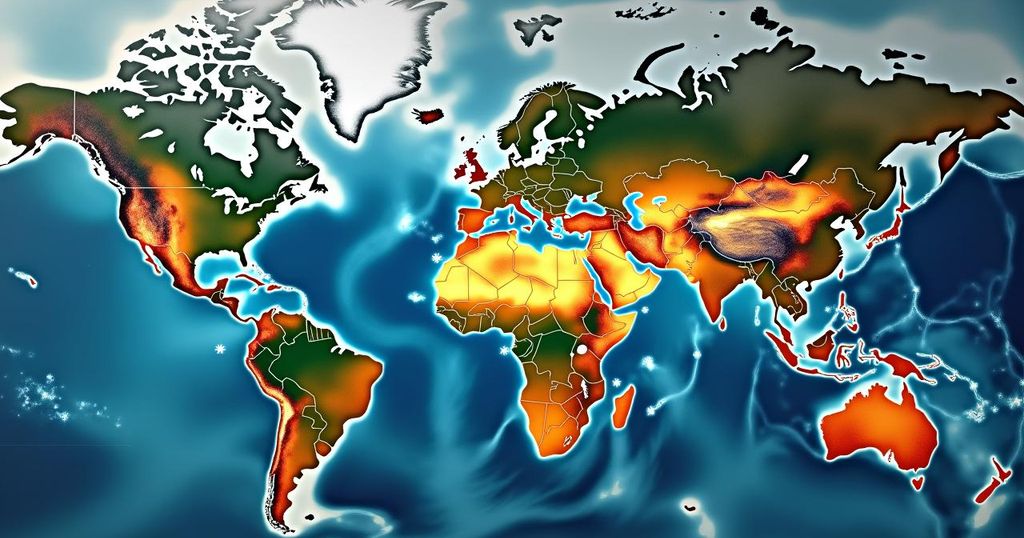Impact of Climate Change on Hurricane Intensity: The Cases of Helene and Milton

Human-induced climate change significantly increased Hurricane Helene’s rainfall by 10% and wind speeds by 11%, with similar impacts anticipated for Hurricane Milton. This trend highlights the dangers of continued fossil fuel consumption, which will likely lead to more severe hurricanes and widespread flooding, emphasizing the urgent need for climate action and preparedness.
Recent studies have demonstrated that human-induced climate change has exacerbated the impact of Hurricane Helene, resulting in a 10% increase in rainfall and an 11% enhancement in wind speeds. A rapid analysis conducted by World Weather Attribution (WWA) indicated that Helene’s wind velocities were increased by approximately 13 miles per hour (20.92 kilometers per hour) due to the warming climate. The elevated sea temperatures that fueled the storm were reported to be 200 to 500 times more probable, with Gulf of Mexico waters exceeding average temperatures by 3.6 degrees Fahrenheit (2 degrees Celsius). Ben Clarke, a climate researcher at Imperial College London, stated, “Hurricane Helene and the storms that were happening in the region anyway have all been amplified by the fact that the air is warmer and can hold more moisture, which meant that the rainfall totals — which, even without climate change, would have been incredibly high given the circumstances — were even higher.” As Hurricane Milton approaches the Florida coast, researchers predict a similar intensification, underscoring the lasting implications of climate change. Scientists caution that a continued reliance on fossil fuels will lead to a concerning increase in hurricane activity, resulting in “unimaginable” flooding far inland, with many casualties arising from extensive inland flooding rather than from high winds. Hurricane Helene, which made landfall in Florida, was characterized by remarkable storm surges of up to 15 feet (4.57 meters) and commanded sustained winds up to 140 miles per hour (225.31 kilometers per hour), devastating regions including Georgia, the Carolinas, Tennessee, and Virginia. The storm is now recognized as the deadliest hurricane to strike the continental United States since Hurricane Katrina in 2005, claiming over 230 lives and causing extensive infrastructural damage. The storm’s rain output exceeded an astounding 40 trillion gallons, a level of precipitation that would have been significantly less severe without the influences of climate change, according to meteorologists. Clarke remarked, “When you start talking about the volumes involved, when you add even just a few percent on top of that, it makes it even much more destructive.” Furthermore, hurricanes with intensities comparable to Helene were previously anticipated to occur every 130 years, but current assessments indicate they are now approximately 2.5 times more likely in the relevant regions. WWA has been assessing extreme weather attribution to climate change since its inception in 2015, employing rigorous methodologies to analyze deviations in climate patterns. Their recent investigations revealed that climate change contributed to an increase of 50% more rainfall in parts of Georgia and the Carolinas, with the rainfall rates being up to twenty times more likely due to global warming factors. While uncertainties remain regarding the extent of climate change’s impact on storms like Helene, as highlighted by Kim Cobb, director of the Institute at Brown for Environment and Society, the consensus is clear: the phenomenon is intensifying the potency and destruction of hurricanes. Looking forward, additional warming over the next two decades is anticipated to worsen hurricane statistics, prompting Cobb to encourage increased emphasis on emergency preparedness and resilience planning. She noted that Helene and Milton present “a wake-up call” as the potential for more severe storms looms unless fossil fuel consumption is addressed. As scientists explore the ramifications of climate change on hurricane activities, Clarke emphasized that managing our future trajectory is within human control, hinging on changes in energy systems and fossil fuel consumption. The rapid succession of hurricanes like Helene and Milton epitomizes the future risks posed by climate change if human behaviors remain unchanged and fossil fuels continue to be a primary energy source.
The increasing frequency and intensity of hurricanes are attributed to human-induced climate change, which significantly alters meteorological conditions leading to more hazardous storms. Studies have shown that warmer ocean temperatures, attributable to climate change, enhance storm activity by intensifying wind speeds and precipitation levels. As evidenced by recent hurricanes, the implications of climate change extend beyond coastal destruction, threatening vast inland populations with catastrophic flooding. Observations from organizations such as World Weather Attribution have been pivotal in attributing specific weather events to climate change, raising awareness about the critical need for climate action and resilience planning in the face of such existential threats.
The research indicates that climate change has markedly intensified the devastation caused by hurricanes, as evidenced by the recent impacts of Hurricane Helene and the projected effects of Hurricane Milton. This underscores the urgent need for proactive measures in emergency preparedness and climate resilience. Continued reliance on fossil fuels poses grave risks of exacerbating future storm intensity and frequency. Collaborative efforts must focus on transitioning to sustainable energy sources to mitigate the ramifications of climate change and protect vulnerable communities.
Original Source: www.texomashomepage.com








